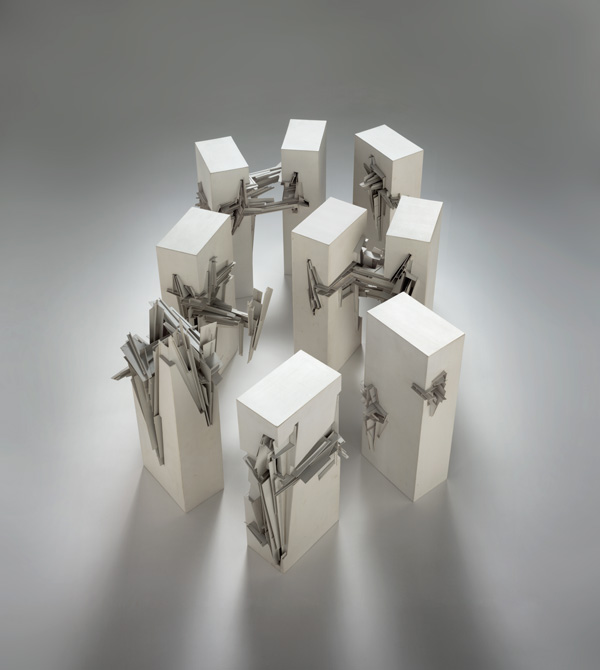Born in Lansing, Michigan, Lebbeus Woods (1940–2012) dedicated his career to probing architecture’s potential to transform the individual and the collective. Woods, who sadly passed away as planning for this exhibition was underway, had an enormous influence on the field of architecture over the past three decades, despite the few built structures to his name. Working deftly with pencil on paper and on intricate models with collaborators, he created complex worlds—at times abstract and at times explicit—that present shifts, cycles, and transience within the built environment.
Lebbeus Woods, Architect brings together significant projects from the past thirty years. Woods’s architecture is emblematic of a period of exploration and theory that emerged in the field in the 1980s. As someone attuned to the human condition, he was more concerned with architecture’s ability to inspire and change our collective understanding of what is possible than with the formal arguments of architectural practice. His prescient proposals offer new architectural typologies and anticipate the need for spaces of uncensored communication, particularly in the face of changing political landscapes and natural calamity. Some structures suggest a disparate alternative, while others acknowledge existing circumstances rather than erase them; they drift above, embed within, or occupy the underground. The architecture on view here, presented through extensive drawings and models, offers an original perspective on humanity’s ability to resist, respond to, and create in adverse conditions. He once said, “Maybe I can show what could happen if we lived by a different set of rules.”
This exhibition marks the first presentation of an architect’s work at the Broad MSU. Zaha Hadid, the architect who designed this museum, was a longtime friend and colleague of Lebbeus Woods. Each architect contributed tremendously towards a burgeoning experimental architecture discourse, and Hadid has spoken publicly of Woods’s impact and influence on her practice. Lebbeus Woods, Architectoffers visitors further insight into the context and significance of this building by bringing it into dialogue with Woods’s provocative ethos and transformative designs, which find formal and conceptual echoes in the structure and spaces of these galleries.
http://broadmuseum.msu.edu/exhibitions/lebbeus-woods-architect
Lebbeus Woods, Architect brings together significant projects from the past thirty years. Woods’s architecture is emblematic of a period of exploration and theory that emerged in the field in the 1980s. As someone attuned to the human condition, he was more concerned with architecture’s ability to inspire and change our collective understanding of what is possible than with the formal arguments of architectural practice. His prescient proposals offer new architectural typologies and anticipate the need for spaces of uncensored communication, particularly in the face of changing political landscapes and natural calamity. Some structures suggest a disparate alternative, while others acknowledge existing circumstances rather than erase them; they drift above, embed within, or occupy the underground. The architecture on view here, presented through extensive drawings and models, offers an original perspective on humanity’s ability to resist, respond to, and create in adverse conditions. He once said, “Maybe I can show what could happen if we lived by a different set of rules.”
This exhibition marks the first presentation of an architect’s work at the Broad MSU. Zaha Hadid, the architect who designed this museum, was a longtime friend and colleague of Lebbeus Woods. Each architect contributed tremendously towards a burgeoning experimental architecture discourse, and Hadid has spoken publicly of Woods’s impact and influence on her practice. Lebbeus Woods, Architectoffers visitors further insight into the context and significance of this building by bringing it into dialogue with Woods’s provocative ethos and transformative designs, which find formal and conceptual echoes in the structure and spaces of these galleries.
http://broadmuseum.msu.edu/exhibitions/lebbeus-woods-architect
